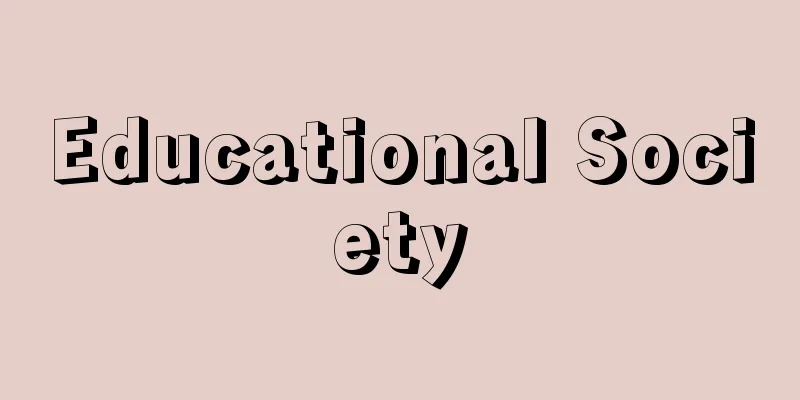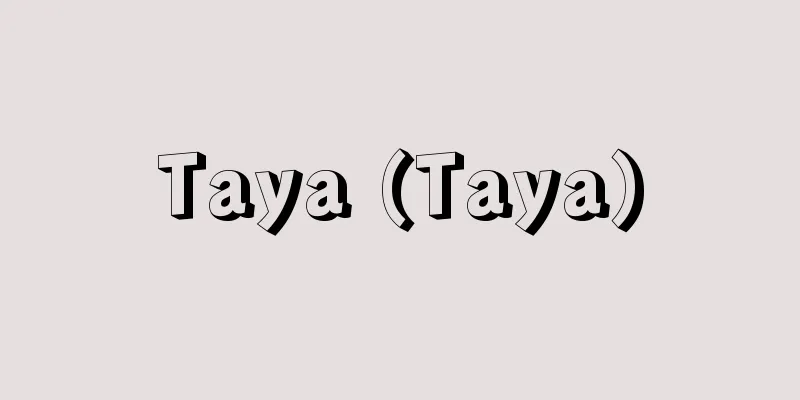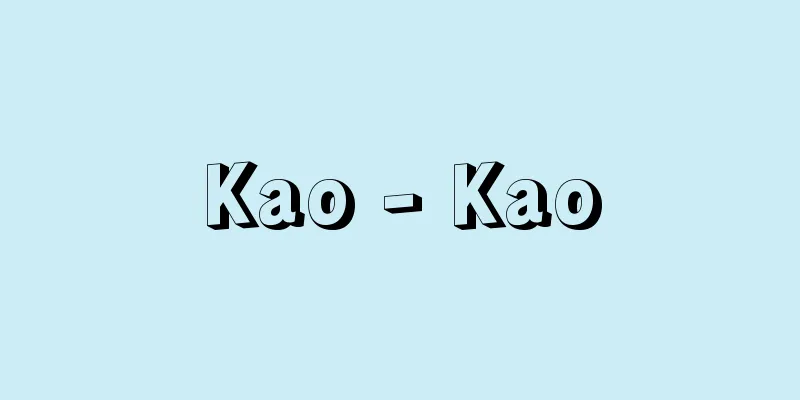Educational Society

|
An academic society is one in which one of the main criteria for determining social status is academic background. Social status includes professional status, but also has a broader meaning, including cultural status. Various criticisms have been leveled against an academic society since ancient times. Typical criticisms are the existence of disparities between universities in terms of employment and marriage, and discrimination based on academic background. There is also a lot of criticism of entrance exams. There is also a great deal of criticism of the way schools are managed and taught, and the education industry outside of schools. However, if we consider an academic society objectively, apart from these journalistic discussions, we can understand the inevitability of it becoming this kind of society. [Kenji Yamauchi May 21, 2018] Background to the birth of the educational societyWhat the Meiji Restoration government needed in the Meiji era was outstanding human resources in every field, and an institution that would guarantee a stable supply of them in terms of both quality and quantity. In the class-based society up until that point, the father's status under the feudal system, such as samurai, farmers, artisans, and merchants, determined the child's career path and occupation. As for education, typically, the sons of samurai went to domain schools (domain schools) where they were taught the mindset of a leader, the necessary culture, and imperial studies, such as the Four Books and Five Classics and Neo-Confucianism. In contrast, the children of townspeople and farmers went to temple schools where they were taught practical knowledge and skills such as reading, writing, and abacus. In this way, by attending different educational institutions run by different curricula, children entered the same status as their fathers. However, such a system in which education and occupation are determined by class is not suitable for a time of great reform such as the Meiji Restoration. This is because a considerable number of leaders are needed in a wide range of fields to achieve the national goal of catching up with the West, as represented by the slogan "Enrich the country and strengthen the military" in the early Meiji period, and the level of knowledge and skills required of leaders is constantly improving. In such a time of change, the system that relies on class does not work well to steadily train leaders in terms of both quality and quantity, and it is difficult to imagine that excellent leaders will steadily emerge one after another through a laissez-faire process. Therefore, a more efficient system of training and promoting human resources is needed. What was thought to meet this need at the time was the academic credential society and academic credentialism (although it was not until the 1960s that these terms became established). Children from as wide a range of classes as possible were gathered in a place called a school, and they were made to compete according to certain rules. Then, social and occupational status was assigned according to their performance (grades, achievements) in the school. [Kenji Yamauchi May 21, 2018] The role and benefits of an educational societyOn the one hand, the educational credential society played a role in establishing a cultural foundation, such as the spiritual and intellectual integration of the nation and improving literacy rates, and on the other hand, it played a role in steadily supplying leaders in many areas in terms of both quality and quantity. In other words, in a word, it was a mechanism that supported modern Japan. The educational credential society has often been spoken of in contrast to a merit society or ability society, and has often been spoken of as something that hinders the realization of a merit society or ability society. And Western countries, especially the United States, are often given as examples of countries that have realized a "meritocracy or ability society." However, in light of the above-mentioned history, the educational credential society is not an obstacle to the realization of a "meritocracy or ability society," but rather should be seen as one of the means to realize it. Even in Western societies, including the United States, a naked "meritocracy or ability society" has not become a reality. For example, the evaluations and letters of recommendation from superiors and influential people at previous employers are given importance, as well as past achievements in a field, so we are in a situation that could be called a career or resume society. For these societies, being a career-based society is a way to realize a "meritocracy/ability-based society." In Japan, the career is not a work-related career, but merely an educational career (educational background). Of course, there are many academic criticisms based on data, in addition to the journalistic criticism mentioned above. For example, there is the view that an academic society appears to be a competitive society under equal conditions, but in reality it only contributes to the reproduction of classes. However, on the other hand, there have been movements since the 1990s to make the academic society more academic. Compared to Western countries, Japan has one of the highest numbers of university graduates, but the percentage of those who go on to graduate school is low. However, when it comes to finding employment at an international organization, it is common to have a master's degree, and having only a bachelor's degree is a disadvantage. Also, when looking at the educational backgrounds of diplomats and ambassadors, while even in countries with low educational backgrounds, many have master's or doctoral degrees, many of Japan's diplomats and ambassadors only have bachelor's degrees. There is a strong argument that universities and graduate schools should be reorganized as places for vocational training and the acquisition of advanced knowledge and skills, and that the number of graduate school students should be increased to train professionals who require advanced knowledge and skills, such as in specialized professions. These demands have already been realized to a large extent in the form of law schools, teacher training schools, MBAs, accounting schools, etc. For a long time, there were many university faculty members, particularly those in the humanities, who did not hold doctoral degrees, but since the 2000s, an increasing number of universities have made doctoral degrees a prerequisite for new hires and promotions. [Kenji Yamauchi May 21, 2018] Equal educational opportunities and qualificationsFurthermore, while criticism of the educational credential society is widespread in Japan, in developing countries education is seen as one of the basic human needs, and with the assistance of international organizations, the public and private sectors of both the domestic and international governments are working together to increase school enrollment rates. This leads to better career opportunities, and the story of helping the poor escape poverty is still alive. In other words, there are societies that are intentionally trying to promote an educational credential society, like Japan in the Meiji era. What is important is not to view educational background as a fixed individual attribute, but as something that indicates the variable level of a person's knowledge and skills, and as proof of the training they have received, and it is believed that the educational reforms currently being carried out in higher education institutions are also moving forward from this perspective toward the realization of a lifelong learning society. Of course, as a prerequisite for this, it goes without saying that there must be even greater efforts made to equalize educational opportunities. [Kenji Yamauchi May 21, 2018] "Outline of Social Education: From an Academic Society to a Learning Society" edited by Inoue Isao and written by Takatsu Takateru et al. (1994, University Education Publishing) " ▽ "Academic Society: A New Disease of Civilization" written by Ronald Philip Doerr and translated by Matsui Hiromichi (1998, Iwanami Shoten)" ▽ "Academic Society and Education" by Yamauchi Kenji (included in Perspectives on Contemporary Society and Education edited by Miyazaki Kazuo and Yonekawa Hideki, 2000, Minerva Shobo)" ▽ "Readings: Japanese Education and Society 2: Academic Society and Examination Competition" edited by Honda Yuki and Hirasawa Kazushi (2007, Japan Library Center)" [References] | | | | | | | | |Source: Shogakukan Encyclopedia Nipponica About Encyclopedia Nipponica Information | Legend |
|
学歴社会とは、社会的地位を決める主たる基準の一つが学歴であるような社会である。社会的地位とは職業的地位を含むが、もっと広い意味であり文化的地位なども含む。学歴社会に対しては、古くからさまざまな批判がなされてきた。就職や結婚と関係した大学間格差の存在や、学歴による差別に対する批判はその代表的なものである。さらに入学試験に対する批判も多い。また、学校の管理・教育のあり方や学校外の教育産業に対する批判も数多くみられる。ただし、こういったジャーナリスティックなレベルでの議論とは別に、客観的に学歴社会を考察してみると、こういった社会になっていく、それなりの必然性が理解できる。 [山内乾史 2018年5月21日] 学歴社会誕生の背景明治時代になり維新政府が必要としたのは、各分野における優れた人材であり、その質的、量的に安定した供給を保証してくれる機構であった。それまでの身分社会では、主として士農工商のような封建制度下の父の身分が子の進路、職業を決定した。教育についても、典型的にいえば、士族の子は藩校(藩学)に行き、四書五経や朱子学など人の上にたつ者としての心構え、必要な教養、帝王学を教えられていた。それに対し、町人・農民の子は寺子屋に行き、読み、書き、そろばんなど実用的な知識・技能を教えられていた。このように別々のカリキュラムによって営まれる異なる教育機関を経て、子は父と同じ身分に参入していったのである。 しかし、このような身分階級に縛られた形で人の教育や職業が決定されるシステムは、明治維新期のような大改革の時期には適さない。なぜなら、明治初期の「富国強兵」というスローガンに代表されるような欧米に追い付くことを意図した国家目標の達成のためには、幅広い分野で相当数のリーダーが必要とされるからであり、しかも、リーダーに求められる知識・技術の水準は絶えず向上していく。こういった変革期に、リーダーを質・量両面で安定的に養成するためには、これまでの身分に依存したシステムではうまく機能しないし、レッセ・フェール(自由放任)の過程から優れたリーダーが次々と安定的に登場してくるとも考えにくい。したがって、より効率的な人材養成、登用のシステムが必要である。この必要性を満たすものと当時考えられたのが学歴社会・学歴主義であった(もっともこのような呼び名が定着するのは1960年代の話である)。学校という場にできるだけ広い諸階層の子供を集め、そこで一定のルールに基づいて子供を競わせる。そして学校という場でのパフォーマンス(成績、実績)に応じて社会的・職業的地位を割り振るというわけである。 [山内乾史 2018年5月21日] 学歴社会の役割と効用学歴社会は、一方では国民の精神的・知的統合や識字率の向上など文化的基盤を整備する役割を果たし、他方では多方面にわたるリーダーを質・量ともに安定的に供給する役割を果たした。つまりひとことでいえば、近代日本を支えてきたメカニズムだったのである。しばしば学歴社会は実力社会・能力社会と対置されて語られてきており、実力社会・能力社会の実現を阻害するものであるかのように語られることが多かった。そして「実力社会・能力社会」を実現している国の例として、欧米諸国、ことにアメリカがあげられることが多かった。しかし、上述のような経緯からいえば、学歴社会は「実力社会・能力社会」の実現を阻害するものではなく、むしろそれを実現する手段の一つと考えられたとみるべきである。アメリカをはじめとする欧米社会にしても、むきだしの「実力社会・能力社会」を現実のものにしているのではない。たとえば、前の勤め先での上司や有力者の評価、推薦状が重視されるとか、その分野での過去の実績が重視されるとか、いわば経歴社会・履歴書社会ともいうべき状況にある。経歴社会であることが、これらの社会にとっては「実力社会・能力社会」を実現するための方策なのである。日本の場合はその経歴が実務面での経歴ではなく、教育面の経歴(学歴)であるにすぎない。 もちろん、先述のようなジャーナリスティックな批判だけでなく、データに基づくアカデミックなレベルの批判も数多い。たとえば、学歴社会は一見平等な条件のもとでの競争的な社会にみえるが、実は階層の再生産にくみするものでしかないという見方がそれである。しかし、逆に学歴社会化を図る動きも1990年代以降みられる。日本では欧米諸国と比べて大学卒業者の数はトップ・クラスにあるが、そのうちで大学院に進学するものの比率は低い。しかし、国際機関に就職する際、修士の学位をもっていることはあたりまえで、学士の学位のみではマイナスになるという状況がある。また外交官、大使クラスの学歴をみると、低学歴社会の国でも修士・博士の学位をもつ者が多くを占めるのに対して、日本の外交官、大使クラスは学士の学位しかもたない者が多い。もっと職業訓練の場、高度な知識・技術を身につける場として大学・大学院を編成し直し、大学院入学者を増やして、専門職などの高度な知識・技術を必要とする職業人を養成するべきであるという主張は根強い。これらの主張はすでに法科大学院、教職大学院、MBA、会計大学院等の形でかなりの程度実現している。また、長らく大学では、文系の教員を中心に博士号を取得していない者が多く存在したが、2000年代以降は博士号取得を新規採用、昇進の必須(ひっす)条件とする大学が増えている。 [山内乾史 2018年5月21日] 学歴と教育の機会均等さらに、日本で盛んに学歴社会批判が展開される一方で、開発途上国においては教育を人間のもつ根本的なニーズ(べーシック・ヒューマン・ニーズ)の一つととらえ、就学率を上げるべく、国際機関の援助を受けながら国際・国内の官民が一体となって取り組んでいる。そして、それがよりよい職業機会につながるのであり、貧困層の貧困からの脱出を助けるというストーリーもまだ生きている。いわば明治期の日本のように意図的に学歴社会化を進めようとする社会もあるのである。 重要なことは、学歴を固定的な個人の属性ととらえずに、可変的なその人の知識、技術の水準を表すものとして、また受けてきたトレーニングの証(あかし)として受け取ることであり、現実に高等教育機関で行われている教育改革もそのような視点から生涯学習社会の実現に向けて走り始めていると考えられる。もちろん、その前提として教育機会の均等化がよりいっそう図られねばならないのは当然である。 [山内乾史 2018年5月21日] 『井上勲編著、高津隆暉他著『社会教育要説 学歴社会から学習社会へ』(1994・大学教育出版)』▽『ロナルド・フィリップ・ドーア著、松居弘道訳『学歴社会 新しい文明病』(1998・岩波書店)』▽『山内乾史著「学歴社会と教育」(宮崎和夫・米川英樹編『現代社会と教育の視点』所収、2000・ミネルヴァ書房)』▽『本田由紀・平沢和司編著『リーディングス 日本の教育と社会2 学歴社会・受験競争』(2007・日本図書センター)』 [参照項目] | | | | | | | | |出典 小学館 日本大百科全書(ニッポニカ)日本大百科全書(ニッポニカ)について 情報 | 凡例 |
<<: Hidden Christians - Kakurekirishitan
Recommend
Detective - keiji
It is the term used at the beginning of laws, pro...
External photon effect detector - external photon effect detector
…A photoelectric detector that is sensitive to th...
Tiergarten Schönbrunn (English spelling) Tiergarten Schonbrunn
…The same can be said about animal collections by...
Mont Pelvoux (mountain)
It is part of the crystalline massif of the northe...
Facial lines
…The transverse groove just before the cervical r...
Color rendering
If the spectral distribution of the light emitted ...
Cuenca (English spelling)
The capital of Azuay province in southern Ecuador....
The King's Witness - Oushinchi
…909-945. A state founded in Fujian by the brothe...
Sima Chengzhen - Shiba Shōtei (English spelling)
647‐735 A leader of the Shangqing sect of Taoism d...
"Ohanchoemon" - Ohanchoemon
...Written by Suga Sensuke. Commonly known as &qu...
Issin
…It is the present-day city of Ishan al-Bachrīyāt...
Bolān Pass (English spelling)
This pass is located in the saddle of the Brahi Mo...
Clinometer - Clinometer (English spelling)
A simple surveying tool used in geological survey...
Double blind test
...In other words, the efficacy and safety for th...
Geological Survey
A national agency that conducts surveys and resear...









